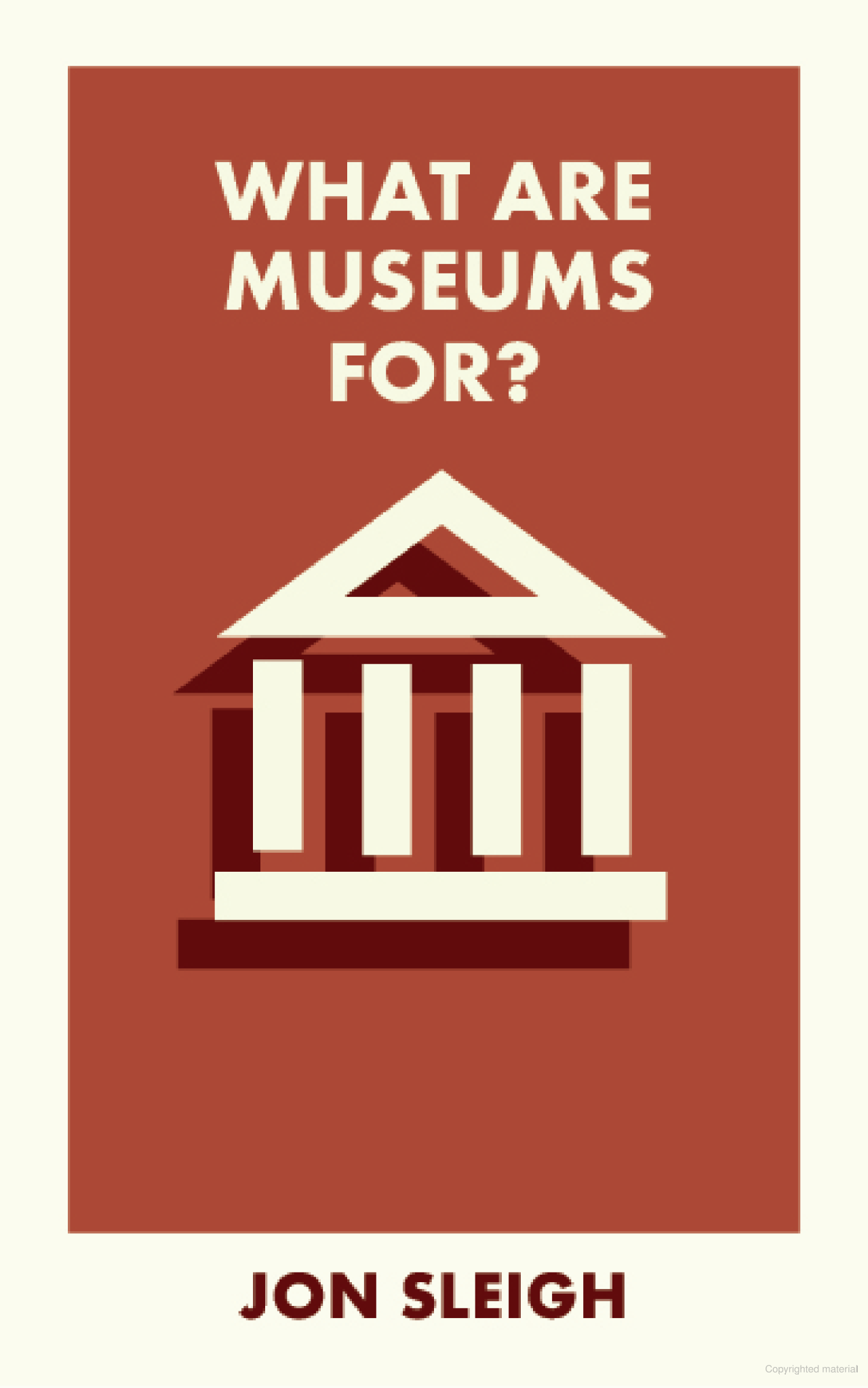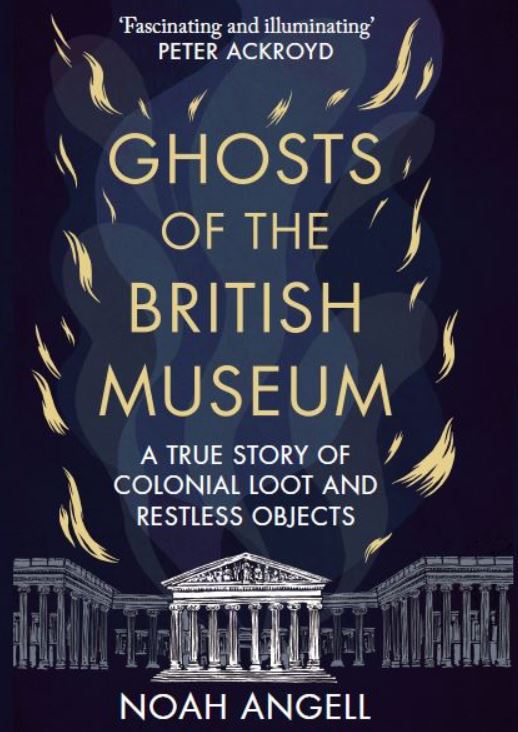Jon Sleigh’s What Are Museums For? is one of a newish series from Bristol University Press in the vein of OUP’s Very Short Introductions or Bloomsbury’s 33&1/3. Other titles interrogate animal rights, the Olympics, philanthropy, and prisons; I’m looking forward to reading the volumes on music, journalism, and monarchy. Sleigh talks to people from the Ashmolean and British Museums alongside those from provincial collections (in the UK and Commonwealth) and niche museums dedicated to single topics and places. For those engaged with history and heritage, this book might turn out to be a bracing read. It was for me. In many cases the message is that museums are not “global [hubs] of scholarship, open to all”, to quote Neil MacGregor in Charlotte Higgins’ recent Guardian long read, but oppressive, uninviting spaces that force their visitors to submit to their intellectual authority and version of history. For example, I was content to view Classical antiquity in its Mediterranean context. I hadn’t really dealt with the possibility that its appropriation by 19th Century imperialists prevents a great many people from having a positive emotional reaction to its artefacts.
That said, the overwhelming impression from Sleigh’s interviewees is that museums ought to be for everyone. These curators and museum staff may express it in different ways, but it’s clear that certain institutions, particularly those whose collections originate in Wunderkammern or the Grand Tour, have work to do to fulfil that ideal. There doesn’t seem to be dogma in museology beyond thoughtfulness and willingness to listen – this is a read gloriously removed from the rhetoric of culture wars – though it takes as much work again to prove to people that the work has been done, let alone get them into your museum in the first place. This gently provocative book often zooms out to imagine how museums and their collections may be viewed subjectively by the society that visits them, rather than as part of state apparatus to which people are subjected when they visit. The British Museum’s resemblance to a classical temple is more than superficial. Sleigh insists that “museums are not neutral. They were never intended to be.” The so-called universal museums are not important in this book and so little of it is relevant to the case of the Marbles. With Jon Sleigh and his interviewees, we’re among friends: as far as the author is concerned, they’re in the wrong place.
Sleigh also makes the point that, “at its inception… men were the expected primary audience within a patriarchal structure”, which makes one think not just of Archer’s painting of the temporary Elgin Room in 1819, which contains 16 men and four (accompanied) women, but also of Elgin’s initial display of the sculptures in the “shed on Park Lane”, alongside nude boxers – alas, no painting of this, so the gender split in the audience must remain a mystery.
This thought-provoking book repeatedly talks about museums catering for the past, present, and future in varying proportions – a means of inspiring how a newly-opened museum might behave. Speaking personally, there’s a lot of performative jargon which I had to work quite hard to understand, but its ethics are sound. What’s clear is that the niche museum is the future (that’s my interpretation, not Sleigh’s), and not just because it’ll be increasingly inappropriate to acquire and hoard collections from global sources. The universal museums are already isolated, and the breadth of their collections hasn’t resulted in the intended insights, comparisons, or levelling up (call it what you will) but rather encourages gatekeeping. Intersectionality is the way forward, but of visitors, not collections. Sleigh draws a direct line between BM founder Hans Sloane and 80s individualism:
The singular nature of where a museum can start from is vividly seen in Sloane himself – his wealth, his art[istic] taste, his social interactions, political decisions, and wishes are still to this day[sic] functioning today within UK democracy…
This is shortly followed by a quote from former BM director David M. Wilson:
Each generation makes its own contribution to the museum, and often it is the actions of individuals that change its course.
To me, that has shades there being “no such thing as society”.
There are a few more uncomfortable truths at play here – for example, digitising of collections increases accessibility for some constituencies while establishing barriers to others. Sleigh’s experts are big on the idea of placing their collections in a context that is relatable to the audience, particularly in collections where the audience may have lived experience of the exhibits: the example given is Matt Smith’s porcelain piece Happy Union, displayed in Liverpool’s Walker Art Gallery, which sits among the 19th Century chintz but is charged with the legalisation of same-sex partnerships in 2013. The Marbles’ original context, that of 4th Century Athenians, is unattainable, despite Alma-Tadema’s best efforts. But as we always rebuffed those who point out that they can’t be reattached to the Parthenon: their display in an airy gallery within sight of the temple, in Attic light, is a pretty good compromise, and a damn sight better than their gloomy cell in Bloomsbury.

There are ghostly traces of old arguments on both side of the Marbles debate in What Are Museums For? You don’t have to believe in the supernatural to enjoy Ghosts of the British Museum: A True Story of Colonial Loot and Restless Objects. It’s not clear if author Noah Angell does, though some of his interviewees certainly do. Ghosts exist insofar as the human belief in them does, in our culture and those of the ancient worlds whose artefacts populate our museums. The supernatural conceit is a clever means of exploring colonial legacies in archaeology, science, cultural trafficking, and tourism. This is best proved in Angell’s chapter on the caryatid in Room 19, which covers similar ground to AE Stallings’ superior 2023 Hudson Review article (a book-length version of which, Frieze Frame, is about to be published): contemporary Ottoman feelings about the sculptures and Elgin’s agents, the structural groaning of the remaining caryatids for their lost sister, and the debate of 1816 on the government’s prospective purchase of Elgin’s collection. The BM’s more durable arguments for retention of the sculptures are pricked and punctured, and as such this chapter would be a good digested read to bring the uninitiated up to speed if they don’t have time for Stallings’ much longer investigation.
Running through both these books is something obvious and peripheral to the Marbles debate; that the current model of the world’s biggest museums is out of kilter with the way the wind is blowing. However, if the biggest museums are to get with the programme, they must look to Erik Olin Wright: they must be dismantled rather than destroyed. And they certainly mustn’t hunker down and stick their fingers in their ears.
Angell goes into greater depth elsewhere in the book, but his Greek-centric chapter mentions the pending case of former BM curator Peter Higgs’ selling of items from the museum’s collection, the same that triggered the resignation of director Hartwig Fischer and deputy director Jonathan Williamsin 2023. Curious to think that the collection’s continued similarity to a Wunderkammer and not a 21st Century museum facilitated a scandal that may yet prove a catalyst in the marbles’ return to Greece. It will be no surprise to any of us that this is the only chapter of Angell’s book not to feature an interview with a British Museum employee past or present. It also lacks a single ghost.
